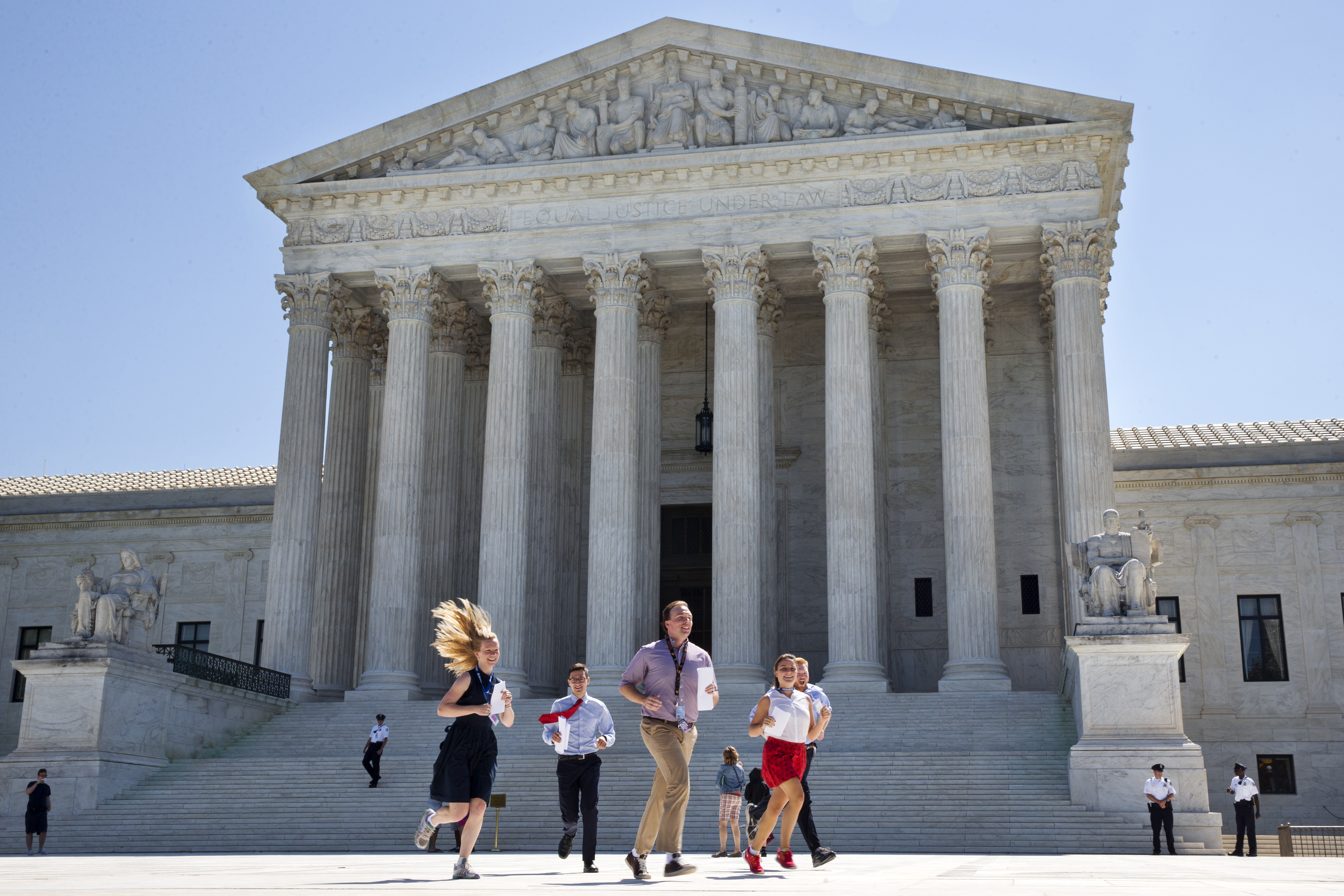Are unpaid internships ever okay?
Legally speaking, yes. But there are some key rules employers have to abide by.

The summer after my junior year of college, I landed an unpaid internship at a women's magazine in New York City. I was over the moon. This was it. I'd made it. I imagined sitting in on meetings where big decisions were made, finding a mentor among the writers whose work I'd read for years, and being given the chance to report articles of my own (articles that would in turn persuade the editors of my eminent hireability).
Then I started my internship. For two weeks, I folded jeans, transcribed writers' interviews, and screened terrible slush-pile short stories that had been submitted for possible publication.
At this point, I began to doubt the value of the unpaid internship proposition.
The Week
Escape your echo chamber. Get the facts behind the news, plus analysis from multiple perspectives.

Sign up for The Week's Free Newsletters
From our morning news briefing to a weekly Good News Newsletter, get the best of The Week delivered directly to your inbox.
From our morning news briefing to a weekly Good News Newsletter, get the best of The Week delivered directly to your inbox.
I tearfully called my parents and told them I wasn't learning anything. They encouraged me to do something else — and I did, spending the rest of the summer working (for money) as a reporter for a small newspaper in Massachusetts.
Leaving the unpaid internship was one of the hardest decisions I'd made at that point in my life. Weren't internships supposed to be a rite of passage? Was I just being soft? More worrisome, was I short-circuiting my career before I'd even started, stepping off the path that would lead to success with the magazine of my choice?
I was reminded of that uncertainty recently when reading about Ivanka Trump and her unpaid interns' tips for making a no-salaried summer job work. The outcry centered on the hypocrisy of a billionaire heiress who peddles female empowerment and then fails to pay her interns. But it made me curious. What can any intern rightfully expect from her experience — and when is a paycheck one of those things? Are there rules governing any of it?
The answer to the last question is yes, but it gets murky fast, especially when considering the diversity of companies and colleges involved in creating and overseeing internships. Schedule, compensation, intensity, and supervisory style differ wildly from internship to internship. Interns' own objectives play a role, too. It's useful to remember, though, that above all interns should be receiving an education.
A free daily email with the biggest news stories of the day – and the best features from TheWeek.com
Columbia University offers a definition that gets at the philosophical crux of the matter: Internships are "short-term work experiences that allow you to observe and participate in a professional work environment and explore how your interests relate to possible careers … [they] should be substantive learning experiences that provide you with a better understanding of an industry, a position, and of yourself." (Keep in mind, though, that not all interns are students.)
Whether an intern must be paid, however, is a question tied to the exact nature of the work she's doing. The U.S. Department of Labor offers legal guidelines on this point for for-profit businesses. (Nonprofits have no comparable code.) If you adhere to these six criteria, you don't necessarily have to pay interns:
1. The internship experience must be for the benefit of the intern.
2. Interns must not displace existing employees, but work under the close supervision of existing staff.
3. The internship is similar to training that would be given in an educational environment.
4. Interns are not necessarily entitled to a job at the internship's end.
5. Both employer and intern understand that the intern won't be paid.
6. The employer must derive no immediate advantage from the intern's activities, and on occasion its operations may actually be impeded.
The no immediate advantage caveat is key, a "kind of insurance policy, protecting interns against exploitation at the hands of their host companies," says Fast Company.
If all criteria are met, then an internship legally can go unpaid. Otherwise it's on the employer to supply at least minimum wage and overtime pay when applicable. In addition, some states supplement with their own guidelines.
The real world application of these laws has been inconsistent, however, and in recent years unpaid and underpaid interns have been fighting back. One especially high-profile lawsuit — brought against Fox Searchlight Pictures by unpaid interns on the set of the 2010 movie Black Swan — inspired a spate of lawsuits against media companies like NBCUniversal, Hearst Corporation, Fox, and Condé Nast. The lawsuits were based on claims that the interns were doing what should be classified as paid work, with the upshot that some companies changed their policies to compensate interns while others shuttered their internship programs altogether. Fox recently settled out of court and agreed to give a slew of past interns, including the plaintiffs, back pay.
Legally, the tide may be turning against unpaid internships. And statistically speaking, an unpaid internship isn't a great bet. The hiring rate for students with any history of paid internships is 63 percent, according to a survey by the National Association of Colleges and Employers. But the hiring rate for students who complete an unpaid internship is dramatically lower — 37 percent — and nearly the same as for those who don't complete any internship at all, 35 percent. The same survey also uncovered a sizable pay disparity: Paid internship students earned an average starting salary of $51,930 as compared with $35,721 for unpaid internship students and $37,087 for those with no internship experience.
Of course, unpaid internships can pay in other ways — significantly, in college credit. Ultimately it's up to each individual to decide for themselves what's worth it (the acrobatics undertaken by some Washington, D.C., interns offer some eye-opening examples). Looking back on my own experience, I have no doubt that I made the right choice — but also that there are many choices to be made in our long and winding careers. Only time will tell whether they're missteps. Then again, there are many paths that can take you where you want to go.
Alexis Boncy is special projects editor for The Week and TheWeek.com. Previously she was the managing editor for the alumni magazine Columbia College Today. She has an M.F.A. from Columbia University's School of the Arts and a B.A. from the University of Virginia.
-
 ‘Maps are the ideal metaphor for our models of what the world might be’
‘Maps are the ideal metaphor for our models of what the world might be’Instant Opinion Opinion, comment and editorials of the day
-
 What is China doing in Latin America?
What is China doing in Latin America?Today’s Big Question Beijing offers itself as an alternative to U.S. dominance
-
 ‘One Battle After Another’ wins Critics Choice honors
‘One Battle After Another’ wins Critics Choice honorsSpeed Read Paul Thomas Anderson’s latest film, which stars Leonardo DiCaprio, won best picture at the 31st Critics Choice Awards
-
 The pros and cons of noncompete agreements
The pros and cons of noncompete agreementsThe Explainer The FTC wants to ban companies from binding their employees with noncompete agreements. Who would this benefit, and who would it hurt?
-
 What experts are saying about the economy's surprise contraction
What experts are saying about the economy's surprise contractionThe Explainer The sharpest opinions on the debate from around the web
-
 The death of cities was greatly exaggerated
The death of cities was greatly exaggeratedThe Explainer Why the pandemic predictions about urban flight were wrong
-
 The housing crisis is here
The housing crisis is hereThe Explainer As the pandemic takes its toll, renters face eviction even as buyers are bidding higher
-
 How to be an ally to marginalized coworkers
How to be an ally to marginalized coworkersThe Explainer Show up for your colleagues by showing that you see them and their struggles
-
 What the stock market knows
What the stock market knowsThe Explainer Publicly traded companies are going to wallop small businesses
-
 Can the government save small businesses?
Can the government save small businesses?The Explainer Many are fighting for a fair share of the coronavirus rescue package
-
 How the oil crash could turn into a much bigger economic shock
How the oil crash could turn into a much bigger economic shockThe Explainer This could be a huge problem for the entire economy